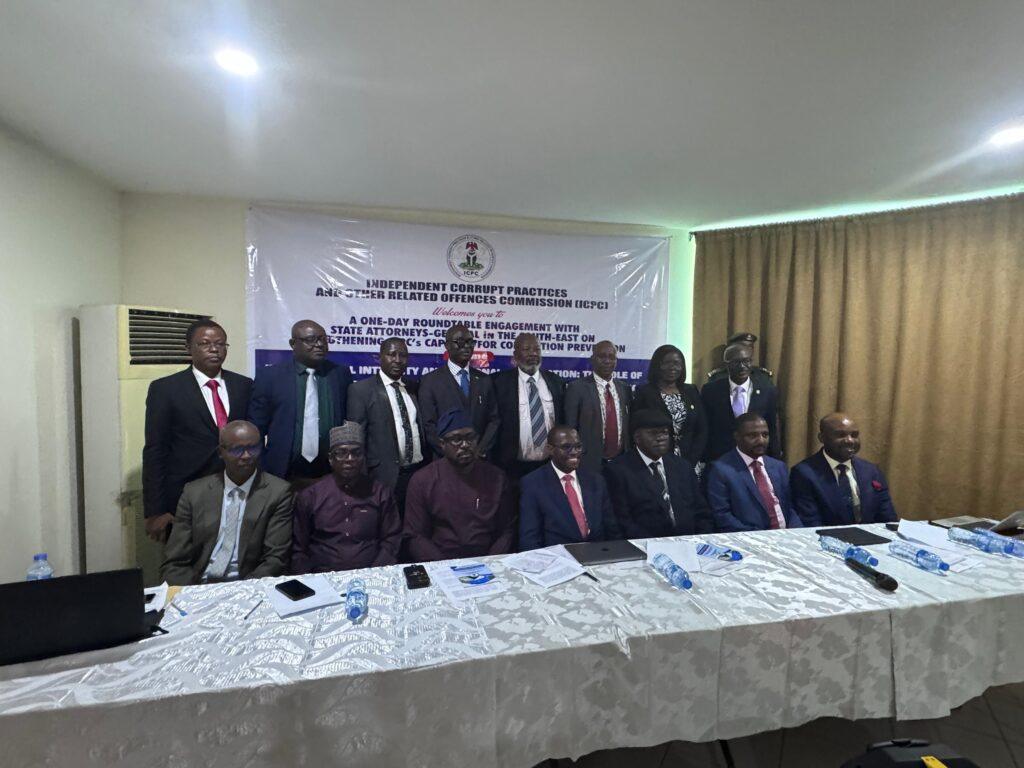In a major stride towards strengthening Nigeria’s anti-corruption architecture, the Independent Corrupt Practices and Other Related Offences Commission (ICPC) on Wednesday hosted a high-level Roundtable Engagement with State Attorneys-General from the South-East region, reaffirming its commitment to deepening federal-state collaboration in the fight against corruption.
Held in Abuja, the engagement is part of a series of zonal consultations designed to foster synergy between the Commission and state-level legal authorities, ahead of ICPC’s second national anti-corruption summit slated for later this year.
In his opening remarks, ICPC Chairman, Dr. Musa Adamu Aliyu, SAN, emphasized that fighting corruption requires more than enforcement—it demands strategic partnerships and preventive approaches.
“This engagement is designed to deepen collaboration, enhance intelligence sharing, and align our strategies with both regional peculiarities and national priorities,” Dr. Aliyu said.
He began on a somber note by paying tribute to late former President Muhammadu Buhari, GCFR, describing him as a “moral compass” whose legacy in anti-corruption had left an indelible mark on Nigeria.
One of the central themes of the roundtable was the recurring jurisdictional conflict between federal and state anti-corruption responsibilities. Dr. Aliyu cited landmark rulings — AG Ondo v. AGF & 35 Ors (2002) and Kogi State & 18 Ors v. AGF (2024) — which upheld ICPC’s constitutional powers to prosecute corruption regardless of whether federal or state actors are involved.
“It is counterproductive when state legal officers continue to challenge powers already affirmed by the highest court in the land,” he stated. “As Chief Law Officers, your duty is to uphold the sanctity of Supreme Court decisions.”
He called for mutual respect, proactive cooperation, and the elimination of institutional resistance in order to realize a unified and effective anti-corruption strategy.
The ICPC Chairman encouraged State Attorneys-General to become front-line champions of transparency and justice in their respective states. He urged them to move beyond advisory roles and actively promote integrity, policy reform, and accountability in governance.
“The synergy between ICPC and State Attorneys-General is not just desirable but essential,” he said. “We must work together in intelligence sharing, asset recovery, and legal reform.”
Delivering the keynote address, Dr. Ibrahim Mukhtar, former Attorney-General of Kano State, described corruption as the root cause of Nigeria’s socio-economic crises, including poverty, insecurity, and unemployment.
“Corruption is not abstract. Its consequences are real and devastating. We must all rise to reverse this trend,” he said.
Dr. Mukhtar proposed the establishment of state-level anti-corruption forums chaired by Attorneys-General, with participation from ICPC, CSOs, and government ministries, to generate tailored solutions to local corruption challenges.
In a goodwill message, Senator Emmanuel Udende, Chairman of the Senate Committee on Anti-Corruption and Financial Crimes, praised ICPC for its leadership and reaffirmed the Senate’s full legislative support for subnational anti-corruption initiatives.
Read also:
- ICPC, Ministry of Housing launch partnership to combat corruption in Nigeria’s housing sector
- ICPC secures conviction of FAAN staff over forged trade test certificate
- Court dismisses suit seeking order against ICPC, EFCC over FHA/ENL estate dea
“This roundtable is a strategic move to deepen federal-state synergy. Attorneys-General must act as frontline advocates of justice and ethical governance,” Senator Udende said.
Similarly, Rt. Hon. Kayode Moshood Akiolu, Chairman of the House of Representatives Committee on Anti-Corruption, stressed that State Attorneys-General must use their legal authority to prosecute—rather than protect—corrupt actors.
“Corruption is the stone tied to our feet as we try to march toward development. It is Nigeria’s number one enemy,” Akiolu declared.
He assured participants that the National Assembly would continue leveraging oversight and legislative powers to foster accountability and support the ICPC’s mandate.
The engagement with South-East Attorneys-General marks a critical step in ICPC’s broader effort to localize the anti-corruption fight, ensure jurisdictional cooperation, and promote a new culture of transparency, preventive enforcement, and institutional accountability.
Dr. Aliyu concluded by expressing optimism that the roundtable would yield actionable outcomes and strengthen the foundation for long-term, cross-jurisdictional partnerships in the war against corruption.
